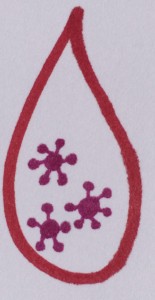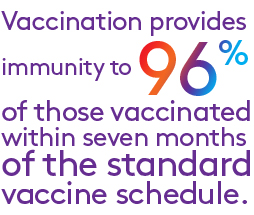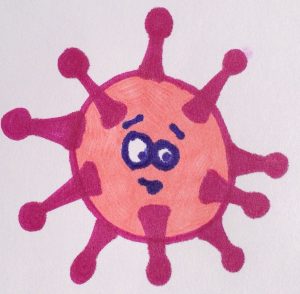Hepatitis B (HepB) Vaccine
The hepatitis B vaccine (HepB) used currently in the United States is synthetically made from recombinant DNA. Let me break that statement down and tell you exactly what it means. This vaccine is considered synthetic because it is entirely made in a lab and contains no human blood products. Why would it ever contain human blood, you ask. Well, the virus is found in human blood, so you may suspect that human blood would be used to make the vaccine. In this case, no human products are ever used in the making of the vaccine, and let me tell you why: because of the use of recombinant DNA techniques.
Viruses, like hepatitis B, are made of DNA, just like the DNA that codes for everything in your body. Recombinant DNA refers to recombining DNA—taking pieces of DNA and putting them together in such a way that the result is not found in nature. So, when we say that the sequence of DNA in the hepatitis virus that is in the vaccine is made of recombinant DNA, it’s like saying that what’s in the vaccine is just pieces of the hepatitis B virus put together. The good news is that because the viral pieces are jumbled, there is absolutely no way that the hepatitis recombinant DNA in the vaccine can cause disease. That being said, your child will NOT get hepatitis B from the hepatitis B vaccine!
Before diving further into the vaccine, I think it’s important to understand the disease you are keeping your child from getting. Without getting too specific, here’s what you really need to know about hepatitis B:

Hepatitis B is a virus that gets into the body most commonly though blood, meaning that an infected person’s blood containing the virus has to get into your body for you to get infected. That being said, IV drug users are most at risk for getting hepatitis B, and I suspect your baby isn’t an IV drug user. However, the virus is also present in semen, saliva, milk, vaginal and menstral secretions, as well as in amniotic fluid. Any of these fluids HAS the potential to infect should your child come in contact with them. This means that you can get the virus through sexual contact, and babies can be given hepatitis B at birth. However, your child cannot get the virus by sharing eating utensils, breastfeeding, hugging, kissing, holding hands, or inhaling particles from coughing or sneezing.2
If the virus should enter your child’s body it will go immediately to the liver and start to reproducing little copies of itself. These copies accumulate without the infected child even knowing that he’s infected, and somewhere between six weeks and six months, you may notice your child displaying symptoms of the virus. Here are some of the things you may notice:
- Fever
- General tiredness
- Lack of appetite
- Nausea/vomiting/abdominal pain
- Dark colored urine
- Clay-colored poop
- Joint pain
- Yellowing of the skin/eyes.
Some, all, or none of these symptoms may arise and may last for several weeks, but can linger for six months.2 Many young children (especially newborns), however, do not show symptoms of the disease. Even if a child is infected and showing no symptoms, he can still spread the virus to others.
REASON #1 for childhood vaccination: The younger a child is when infected with hepatitis B, the more likely it is that he develop a long-lasting infection. “Approximately 90% of infected infants will develop chronic (long-lasting) infection. The risk goes down as the child gets older,” CDC. Liver scaring, liver failure, and liver cancer are potential serious and long-lasting effects of hepatitis B.
REASON #2 for childhood vaccination: Hepatitis B is the cause in 80% of liver cancer cases worldwide.1 HepB is the first anti-cancer vaccine! It can prevent liver cancer!
REASON #3 for childhood vaccination: Hepatitis B cannot be cured with medication, and children who get hepatitis B often need to be hospitalized.
REASON #4 for childhood vaccination: Most of the people with long-lasting hepatitis B throughout the world were infected in the first few years of life.2 The truth is that this is a completely preventable disease when you are vaccinated correctly. The best way to keep from getting hepatitis B is through getting vaccinated, and getting vaccinated early!
The CDC recommends that all children get the first dose of the hepB at birth, and then get 2 more doses over the next six-month period. After getting at least three doses, the vaccine yields greater than 90% protection against hepatitis B when exposed to the virus after the completion of the entire series of vaccinations.2
The CDC recommends that you follow this vaccination schedule in order for your child to have full protection from hepatitis B:
- First Injection – At any given time, usually at birth
- Second Injection – At least one month after the first dose
- Third Injection – Six months after the first dose
HepB will be given to your baby in the thigh (adults would get this in the upper arm where there is plenty of muscle). Once the fluid has been injected into the body, your child’s immune system takes over and makes antibodies to the virus. Those antibodies hold the memory of particular parts of the virus and attack the virus should it ever enter the body. The child must receive all three doses of the vaccine for the body to be able to properly recognize and attack the virus. With each dose of the vaccine, your child’s memory antibodies are being “tested” and their memories grow stronger, much like if you were to study material you were going to be tested on later.
Is this vaccine safe? Yes! Thankfully, no serious side effects have been reported with this vaccine in the United States.2 However, I’m not telling you not to worry. Please, please, worry away! You have a right to worry, and you should worry! Our poor children are stuck with so many needles at one time, and many parents are concerned that this may cause problems as far as the vaccine working properly. According to the CDC, HepB can be given when other vaccines are given, and the vaccine will still work as it is supposed to. Giving HepB at the same time as other vaccines will not harm the child, but with HepB, like most vaccines, there will be some soreness at the injection site.

(Photo courtesy of https://www.medisys.ca)
The only reasons not to vaccinate are if your child has a serious allergic reaction to a prior dose of the vaccine (in that case, do not complete the following doses), or if there is a known SERIOUS allergy to yeast (yeast is used in the making of the vaccine). If you have a very serious allergy to yeast, your unborn child may, also. In my opinion, I would NOT have my child receive this vaccine at birth knowing that an allergy runs in the immediate family and you do not have hepatitis B. You could always have the child tested for the allergy and have them receive the vaccine at a later time. Just to be safe!
What to do if your child has a serious reaction to a vaccine.
It’s great to start thinking about your child’s vaccinations even before your child is born. During pregnancy, if you are receiving proper care, you will be tested for hepatitis B (along with many, many other things). If you find that you have the virus in your body, don’t immediately assume the worst. Here’s what you need to know:
Pregnant women who have the virus already in their body can pass hepatitis B on to their baby during birth. However, this can be prevented by vaccinating your baby with HepB along with a dose of Hepatitis B immune globulin (HBIG) within at least 12 hours of birth. The HBIG contains antibodies to the virus given because your baby’s immune system doesn’t have time to make them to fight the virus off once it has potentially been infected at birth. After all of these precautions, your baby is almost always protected from the disease. If your newborn does not receive the vaccination, he could develop a long-lasting infection and serious health complications–90% of infected, non-vaccinated babies do.2 However, don’t fret; if you are receiving proper care, your child will get the both shots at birth and be hepatitis B free!
Ready to protect your child from Hepatitis B? It’s easy! Agree to the vaccination at birth, and stick to the vaccination schedule that your doctor lays out for your child. Vaccination is the only sure way to prevent this totally preventable disease.
Worried about how you’re going to afford the HepB vaccine? All babies’ and children’s vaccines tend to be covered by private insurance companies. And some clinics offer free or low-cost vaccines. Check with your state’s local public health clinics for low cost/free vaccines. My daughter has received all of her vaccines FOR FREE through the state’s free clinic, and I personally recommend doing so if you are worried about your insurance’s coverage policy. In fact, many doctors offices will give you the state’s free shots if you have no coverage at all. There is also a federal program to help cover the cost of children’s vaccines. For more information, contact the Vaccines for Children Program.
Thanks for reading this, and you are one step closer to making a very informed decision about your child’s health.
References:
- Hepatitis B Foundation. www.hepb.org
- Centers for Disease Control and Prevention. www.cdc.gov
Pictures are Vaccine Mom original Art.
8 thoughts on “Hepatitis B (HepB) Vaccine”
Comments are closed.



You’re right those people are at higher risk. However, getting children immunized at a young age is an attempt to keep the virus out of the population, so that hopefully when your child reaches his teens and twenties, most everyone will have had the vaccination and will not be carrying the disease.
That’s right. I shouldn’t have used the term “causal contact”. You get hep B from blood and bodily secretions.
also, according the same website many children born in North America are not at risk of getting Hep B. This (as well as the technical life span of the vaccine) is why if at all, I believe the vaccine would be more appropriate for teenagers.
“Who is at risk of getting hepatitis B?
Anyone can get hepatitis B by coming into contact with blood or body fluids from someone who is infected with hepatitis B
The following people are at greatest risk. Those who:
Have sex with an infected person
Have multiple sex partners
Have a sexually transmitted disease
Are men who have sexual contact with other men
Inject drugs or share needles, syringes, or other drug equipment
Live with a person who has chronic hepatitis B
Are infants born to infected mothers
Are exposed to blood and body fluids on the job
Are hemodialysis patients
Stay for a prolonged period of time in areas of the world with moderate to high rates of hepatitis B (see map)”
Thank you for your follow up response.
Just trying to clarify here, could you explain how “Hep B can passed through casual contact…”
Because according to http://www.hepbnet.org/about.asp ….
“It is NOT spread through water, food, hugging, kissing, and casual contact such as in schools or the workplace.”
I’m not trying to call you out here – I’m just trying to get the facts straight and learn as much as I can about the disease and vaccine
thanks in advance,
I understand your concern, I really do. The reason your child gets these vaccinations as a baby are so that they become immune at a young age and so that we can start from the begging at keeping these horrible things out of the population. And although your child may be at low risk for getting this disease, it’s mostly because everyone has been vaccinated so young.
Hep B can passed through casual contact, and should this vaccine not exist, it would be spreading through daycares, schools, etc.
Before the vaccine upwards of 18,000 children were infected in the US in the first 10 years of their lives. And people are more likely to develop liver cancer if infected early in life.
Remember, getting your child vaccinated isn’t only for his or her protection, it’s for the protection of the entire community. When an entire community is vaccinated at a young age, the disease has no where to go and no where to hide. Someday when everyone agrees to vaccinate at a young age, the virus will have no place to exist.
Thank you for the response and additional resources.
However, I do still question with the CDC pushes this vaccine on newborns (many of which are not at risk). Even though I’ve seen charts of studies showing that the protection against HepB is slightly higher (by a few percentiles) when you immunize at a younger age, I still do believe that this would be more appropriate for a teenager.
I would rather have the “memory” of the HepB antibodies well into my child’s late 20’s and 30’s than have immunity start to drop around 15 years post vaccine and the “memory” kick in whilst they’re in their 20’s.
Thanks for the very thought-provoking comment!
Yes, that article does make it seem as though our children need a booster at around the age of 12-ish, and you’re right: your child would be at a higher risk for contracting Hep B in his or her late teens and twenties. However, go back and read that last little paragraph…
That reminded me of a few studies I had read a while ago about waining memory antibodies to vaccines, yet continued protection to the disease that they are supposed to be “remembering”. So, I did a little digging and found a study from 2011. You can find the study here: http://m.cid.oxfordjournals.org/content/53/1/68.full
It’s a long study, but basically what they did is look at the memory antibodies in vaccinated individuals over a 20 year period. What they found is that the memory antibodies were definitely much lower as the years passed, however they didn’t find that the individuals had loss of protection to the disease (Hep B). What they found is that the memory the body holds for the Hep B structure long outlasts the antibodies induced from the vaccine. They even found that the body stays protected from hep B even if antibody levels are completely gone. Based on these and similar studies, right now there is no booster recommended for life-long protection.
You are right to worry about the protection of your child. My best answer is to keep up with his/her vaccine schedule, and keep asking questions! And who knows? Fifteen years from now, they may be recommending a booster for hep B when your child goes off to college. It’s entirely possible.
I read on this website that the HepB vaccine will only be effective for 15 years from vaccination. http://www.medpagetoday.com/Gastroenterology/Hepatitis/647
Please correct me if this is wrong, but that would mean that by the age of 21, the child would not be protected against HepB by the vaccinations?
If this is correct, why not vaccinate your 10 year old against HepB which would provide a longer time of protection?
I am confident that my 2 year old does not have a high risk of catching HepB anytime soon and would believe that his 20’s would be a more appropriate time to be protected against HepB.
Looking forward to your comments,